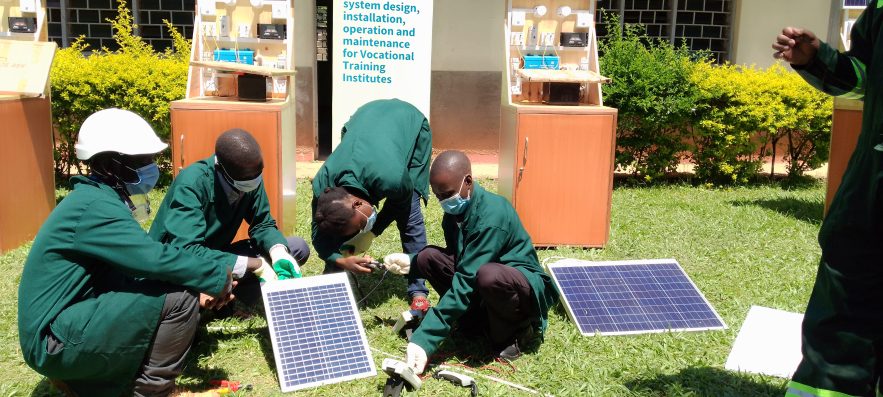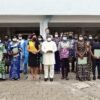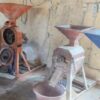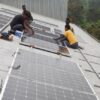“If I can do it, so can other women”

Engineer Christine Alobo from the Ugandan town of Lira graduated from a five-day solar training course funded by Green People’s Energy. Then, the 29-year-old went on to beat male competitors to secure a lucrative job in the Ugandan solar industry. In this interview, she talks about how training helped her community, what advice she gives to women and why men and women should share responsibility for the energy sector.
You were one of ten female engineers who took part in a photovoltaic training course financed by GBE. What did you learn?
Christine Alobo: The training was very intensive and demanding and lasted five days. We learned how to effectively use and maintain solar water pumps and irrigation equipment. We also learned how to grow vegetables using solar-powered irrigation systems, to help increase crop yields and incomes. The trainers emphasised the importance of responsible water management and taught us different solar irrigation methods for very different applications.
How has the training changed your outlook?
Christine Alobo: After the training, I applied for a job as a department manager for a company that distributes solar systems and solar products mainly in West and East Africa. Due to the intensive and practice-oriented training, I was able to prevail over eight competitors because the company emphasised practical expertise. I am glad that I made the step to become a solar consultant and I am very grateful that I can now work in the company. It has really changed my life. Before, I didn’t earn enough money as a teacher, now I run the solar consultancy and I am very happy with it. I also still teach school pupils on weekends.
How has the project concretely affected your environment?
Christine Alobo: Until my training, there were no specialists in solar systems. Only a few people had very limited knowledge. Since the training, I can identify faults and develop solutions together with owners. People used to buy solar modules and batteries indiscriminately from the market. This led to compatibility problems and made systems almost unusable. Since my training, we have now started sizing the systems efficiently and equipping them with protection devices. And we inspect the equipment regularly. This has allowed us to extend the lifespans of the systems. In the meantime, the renewable energy plants in my community are working very well. Their owners are very satisfied.
Have renewable energies always been a topic for you?
Christine Alobo: At school, I found the topic interesting because the cost of electricity was very high before the introduction of renewable energies. With solar systems, you have to invest once and then you benefit for five to seven years. In my area, people therefore prefer solar systems.
You work in a male-dominated sector. How do you experience this?
Christine Alobo: The Ugandan energy sector is indeed a male domain. Interestingly, however, I experience that my knowledge in this area is often greater than that of some men. Many see that too (she laughs). Overall, though, I try not to let this issue get to me too much. I am convinced that my position as head of department can serve as an example. If I, as a woman, have managed to be successful in this position, then it is a signal that other women can do the same.
What helped you achieve your goals?
Christine Alobo: I enjoyed the training. I did not find the requirements and tasks of the training overwhelmingly challenging. My inner motivation helped me cope with the demands of the training. Although we were only two women among eight men, our trainer created a very pleasant atmosphere. However, I know that women do not have it easy in the energy sector and have to fight their way through. In this sense, I was very lucky with my training. It was not only my own attitude that helped me achieve my goals, but also the support I received from both Deutsche Gesellschaft für Internationale Zusammenarbeit (GIZ) and my family.

How do you deal with obstacles in your way?
Christine Alobo: I choose to focus on positive support and ignore the negative. I believe it is important to stay strong and not allow discrimination to hinder my progress or growth.
How do you see your future role in the renewable energy sector?
Christine Alobo: My dream is to start a renewable energy education institute. I want to sensitise and educate society about the use of existing natural energy sources. Currently, many people do not know how to effectively use renewable energy beyond solar panels and batteries. I want to provide them with knowledge and encourage them to use sustainable energy sources, which will ultimately benefit our environment.
What is your vision for Uganda in the field of renewable energy?
Christine Alobo: Renewable energy is often seen as expensive. This makes it difficult to convince people to use it to full potential. However, renewable energy can save money, protect the environment and offer other benefits. If we used the potential for renewables more and met our needs, say 90%, from solar energy, it would create jobs and make life easier.
What are the challenges along the way – in your community, and in Uganda as a whole?
Christine Alobo: There is still a lack of solutions to cover larger energy needs with renewables, for example in industry. For domestic use, solar systems can be affordable and feasible, as households have less electricity-intensive appliances. For industry, we still need solutions. We need PV parks with high capacities.
What advice would you give other women interested in renewable energy and sustainable development?
Christine Alobo: As women, we have unique strengths and abilities. People may perceive us as weak, but we can achieve great things if we only want to. We should not be discouraged and protect our environment with the help of renewables.





